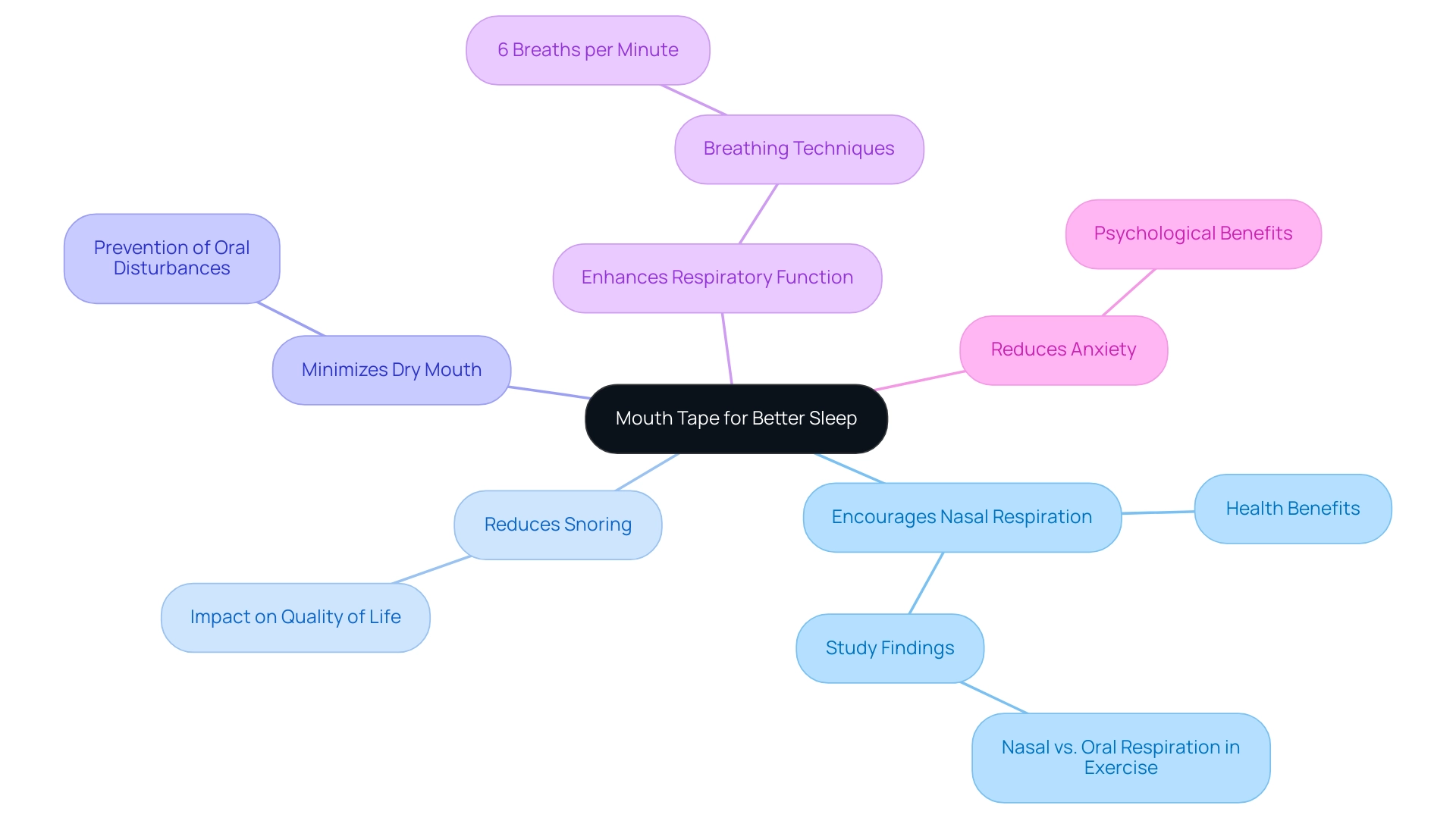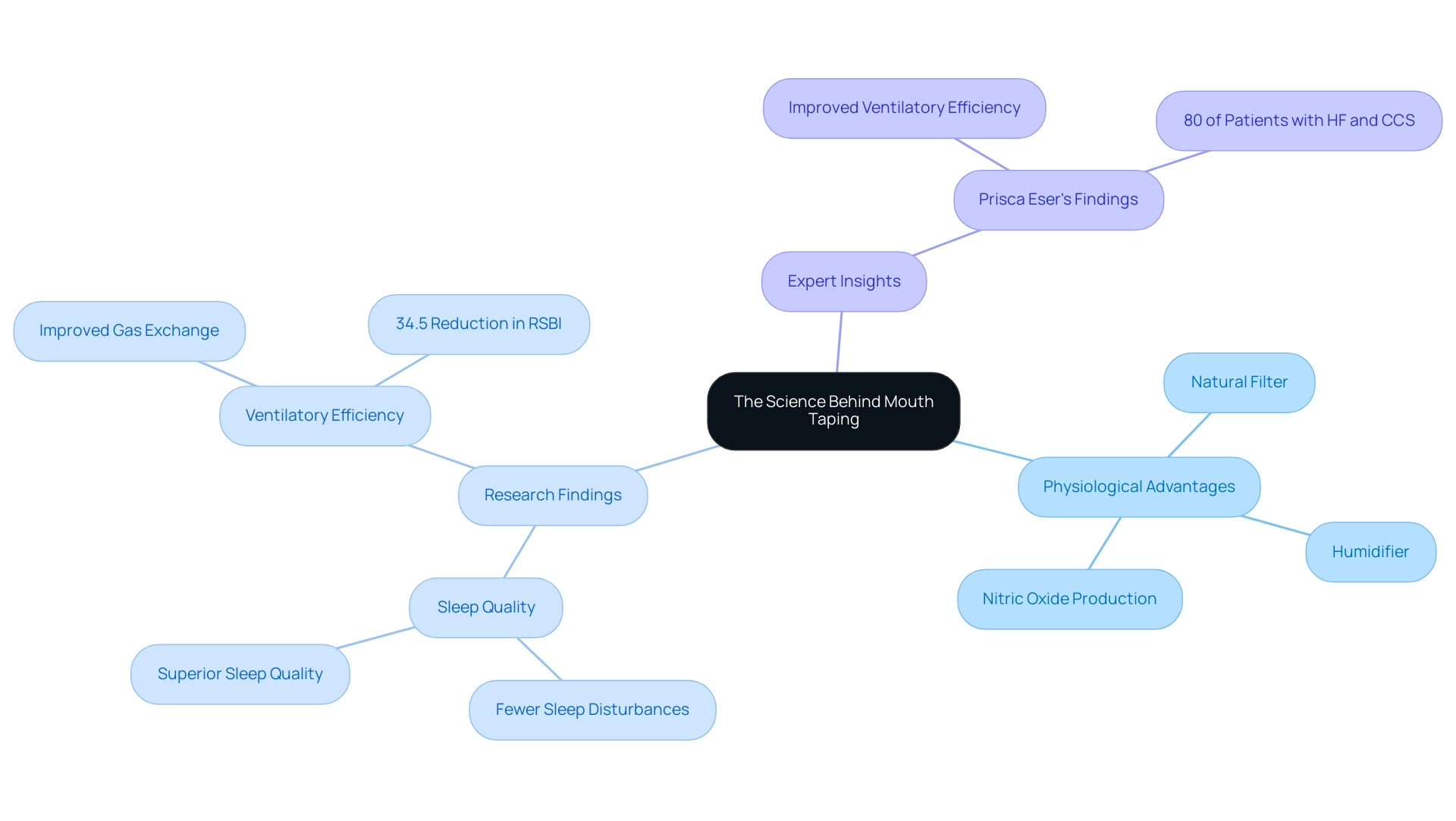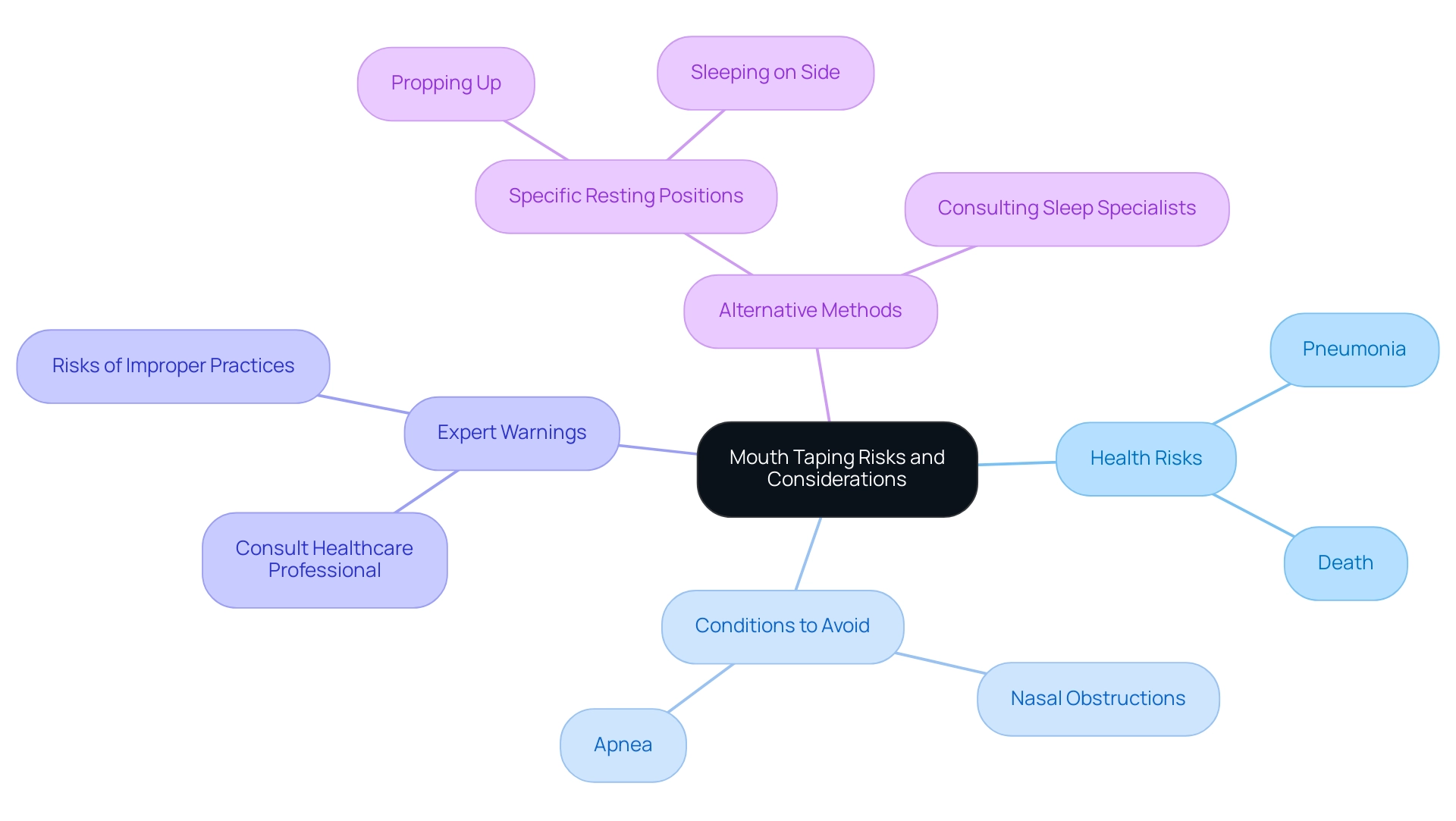Introduction
In the quest for improved sleep quality, innovative solutions are continuously emerging, with mouth taping gaining attention as a practical method to encourage nasal breathing during the night. This technique not only aims to reduce common sleep disturbances like snoring and dry mouth but also promotes overall respiratory health. Grounded in scientific research, mouth taping is associated with various benefits, including:
- Enhanced oxygen intake
- Better oral hygiene
As sleep-related issues become increasingly prevalent, understanding the effectiveness and safety of mouth taping can provide individuals with a valuable tool for achieving a more restorative sleep experience. Exploring the mechanics, benefits, and considerations of this practice reveals its potential to transform nighttime routines for those seeking deeper, uninterrupted slumber.
1. Understanding Mouth Tape: A Solution for Better Sleep
Using tape for the lips is one of the 5 reasons why mouth tape is the secret to better sleep, as it serves as an efficient and simple remedy to encourage nasal respiration during sleep by securely sealing the lips. This practice is based on the awareness that nasal inhalation offers many health benefits compared to oral inhalation, such as enhanced respiratory function and a lower risk of bronchoconstriction. A study titled 'Nasal vs. Oral Respiration in Exercise' highlights the prevalence of oral inhalation among children and its potential negative effects, emphasizing the benefits of nasal respiration.
By promoting nasal inhalation, lip sealing can reduce common nighttime disturbances like snoring and dry oral cavity, highlighting one of the 5 Reasons Why Mouth Tape Is the Secret to Better Sleep, leading to a more rejuvenating rest experience. Recent research indicates that maintaining a consistent pattern of approximately
six breaths per minute can further enhance these benefits, reducing anxiety and improving overall respiratory function. As J.C.W. stated, 'Nasal respiration is essential for optimal health and performance,' underscoring the importance of this practice. As the need for creative rest enhancement methods grows in 2024, investigating oral adhesive techniques as a feasible choice becomes especially important.
2. Top Benefits of Mouth Taping for Sleep Improvement
-
One of the 5 Reasons Why Mouth Tape Is the Secret to Better Sleep is that promoting nasal breathing through mouth taping can significantly enhance oxygen intake, leading to a reduction in disruptions during rest. This leads to deeper and more restorative rest cycles, fostering overall wellness and vitality. Including ashwagandha may further enhance these advantages, as it is recognized for its capacity to alleviate anxiety and support hormonal balance, which are essential for attaining restorative rest. Ashwagandha's rejuvenating properties also support overall wellness. Recent studies have emphasized the effectiveness of oral adhesion, with a Mini-Asthma Quality of Life Questionnaire score averaging 5.33 (SD 1.19), indicating a perceived improvement in rest quality among participants. Furthermore, clinical studies have confirmed that ashwagandha root extracts can improve sleep quality, making it a valuable addition to your nighttime routine.
-
Reduced Snoring: Covering the lips has been shown to effectively decrease snoring by preventing the vibrations that occur when air flows through an open oral cavity. This not only benefits the individual sleeping but also provides a more restful experience for their partner. Additionally, chin straps can serve as an alternative method for reducing snoring by keeping the jaw closed, although they may not work for everyone. Expert opinions on the matter emphasize that applying mouth tape to the lips can be a practical approach to reduce snoring, which is one of the 5 Reasons Why Mouth Tape Is the Secret to Better Sleep, aligning with the experiences of many who have adopted this technique. One of the 5 Reasons Why Mouth Tape Is the Secret to Better Sleep is that by keeping the oral cavity closed during sleep, taping helps maintain moisture levels within it. This reduction in airflow through the oral cavity minimizes discomfort associated with dryness and mitigates potential dental issues that can arise from inadequate moisture. Enhanced Oral Health: Nasal respiration promotes saliva production, which is vital for maintaining oral hygiene. Saliva acts as a natural barrier against cavities and gum disease, making oral closure a helpful practice for those looking to enhance their dental health during rest. Coupling this with ashwagandha's calming effects can create a holistic approach to nighttime wellness.
-
One of the 5 Reasons Why Mouth Tape Is the Secret to Better Sleep is that for those encountering mild apnea, oral adhesive can serve as an additional method to encourage nasal respiration. This approach may help alleviate certain symptoms associated with the condition, potentially leading to a more restful night. A pragmatic study examining the effects of mouth taping in patients with symptomatic asthma found that while there were no significant differences in morning peak expiratory flow or symptom scores compared to usual respiration, many participants reported the practice to be acceptable. The addition of ashwagandha may further assist in managing rest, as it helps
enhance rest quality by nourishing the adrenal glands and influencing the body’s resting patterns. As Geoff McKinnon, a writer focusing on healthcare, emphasizes, improving wellbeing through such practices can lead to happier lives.
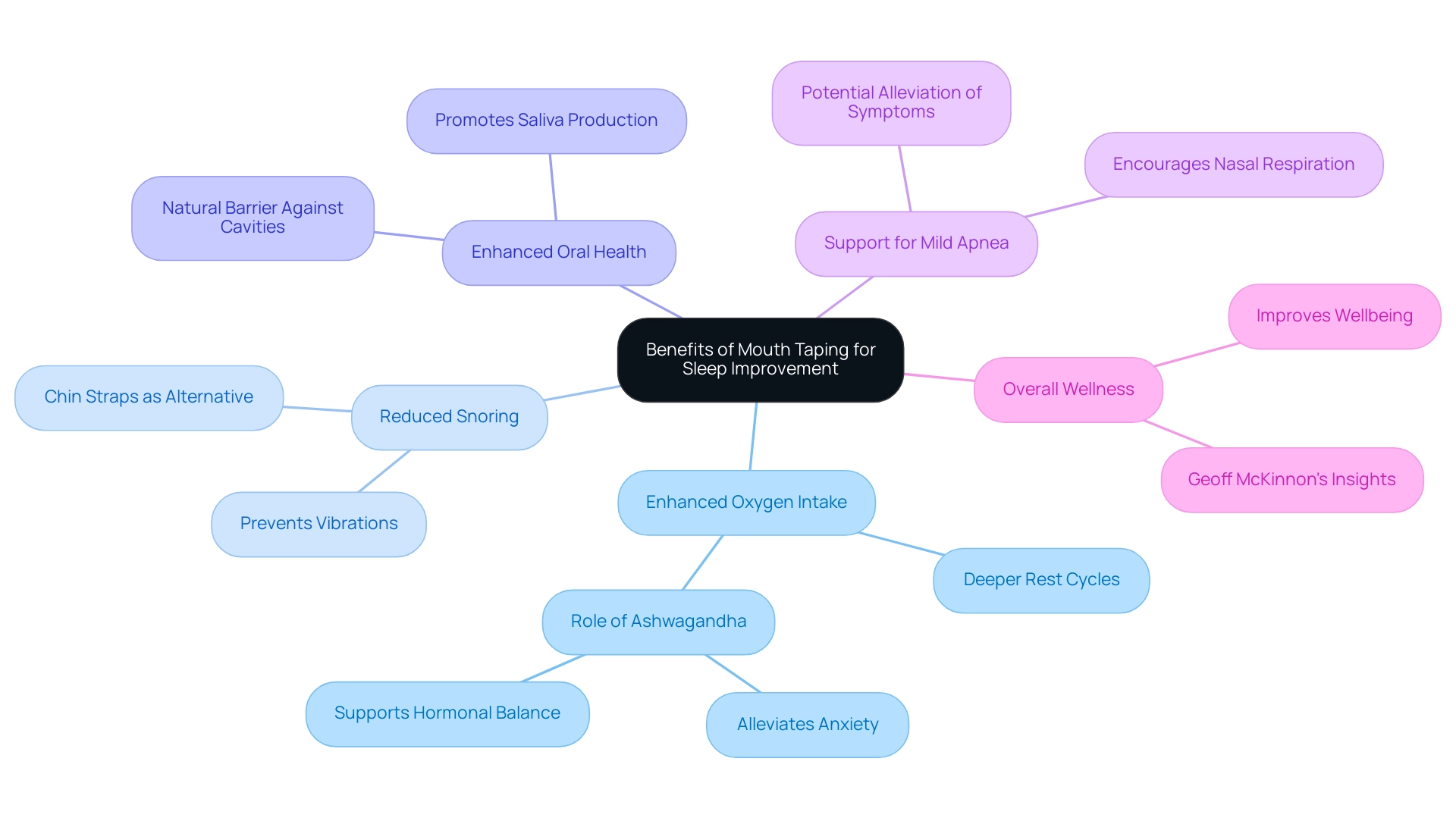
3. The Science Behind Mouth Taping: Evidence and Insights
Recent research emphasizes the various physiological advantages linked to nasal respiration during rest. Breathing through the nose serves as a natural filter and humidifier for the air, effectively reducing the number of irritants that may enter the lungs. Furthermore, studies indicate that nasal inhalation promotes increased production of nitric oxide, a crucial molecule in enhancing oxygen uptake and improving overall circulation.
A systematic review conducted by Fazzini B et al. (2023) emphasizes that individuals who engage in nasal inhalation tend to experience fewer sleep disturbances and enjoy superior sleep quality compared to those who predominantly inhale through their mouths. Supporting this, a case study comparing nasal and oral respiration during exercise found that nasal respiration significantly improved ventilatory efficiency, leading to better gas exchange and ventilation patterns.
As noted by Prisca Eser, 'Nasal inhalation during submaximal exercise significantly improved ventilatory efficiency and abnormal respiratory patterns in 80% of our patients with heart failure and coronary syndrome.' This body of evidence supports the idea that incorporating practices such as taping the lips aligns with 5 reasons why mouth tape is the secret to better sleep, as it could significantly enhance sleep quality by promoting
nasal airflow, thereby maximizing its physiological benefits.
4. How to Safely Use Mouth Tape for Optimal Sleep
-
Choose the Right Tape: Select hypoallergenic medical tape or adhesive specifically designed for this purpose, ensuring it is gentle on the skin and easy to remove without causing irritation.
-
Clean and Dry Your Skin: Prior to application, thoroughly clean and dry your lips and the surrounding area. This enhances both the adhesion of the tape and your overall comfort during use.
-
Apply Before Sleep: Carefully place the tape across the center of your lips right before bedtime. Ensure the tape is secure but not so tight that it restricts your ability to breathe comfortably.
-
Monitor Your Comfort: Throughout the night, be attentive to any sensations of discomfort or difficulty in breathing. Should you experience these issues, it is crucial to remove the tape immediately to prevent any potential complications.
-
Consult a Professional: Individuals with existing health conditions, especially serious apnea or respiratory problems, should seek advice from a healthcare expert before starting this practice. This step is essential to confirm that this practice is appropriate and safe for your specific health needs. Significantly, oral strip application has been demonstrated to be more effective in alleviating sleep apnea symptoms when used alongside a mandibular advancement device, highlighting the 5 reasons why mouth tape is the secret to better sleep, based on a small study. Dr. Anis Rehman, an Internal Medicine Physician, emphasizes, 'Consulting a healthcare professional is vital, especially for those with underlying health issues.' Furthermore, sealing the lips is not advised for people with
nasal breathing issues, serious heart or lung conditions, or those with cracked lips, emphasizing the significance of recognizing personal health risks when contemplating this practice.
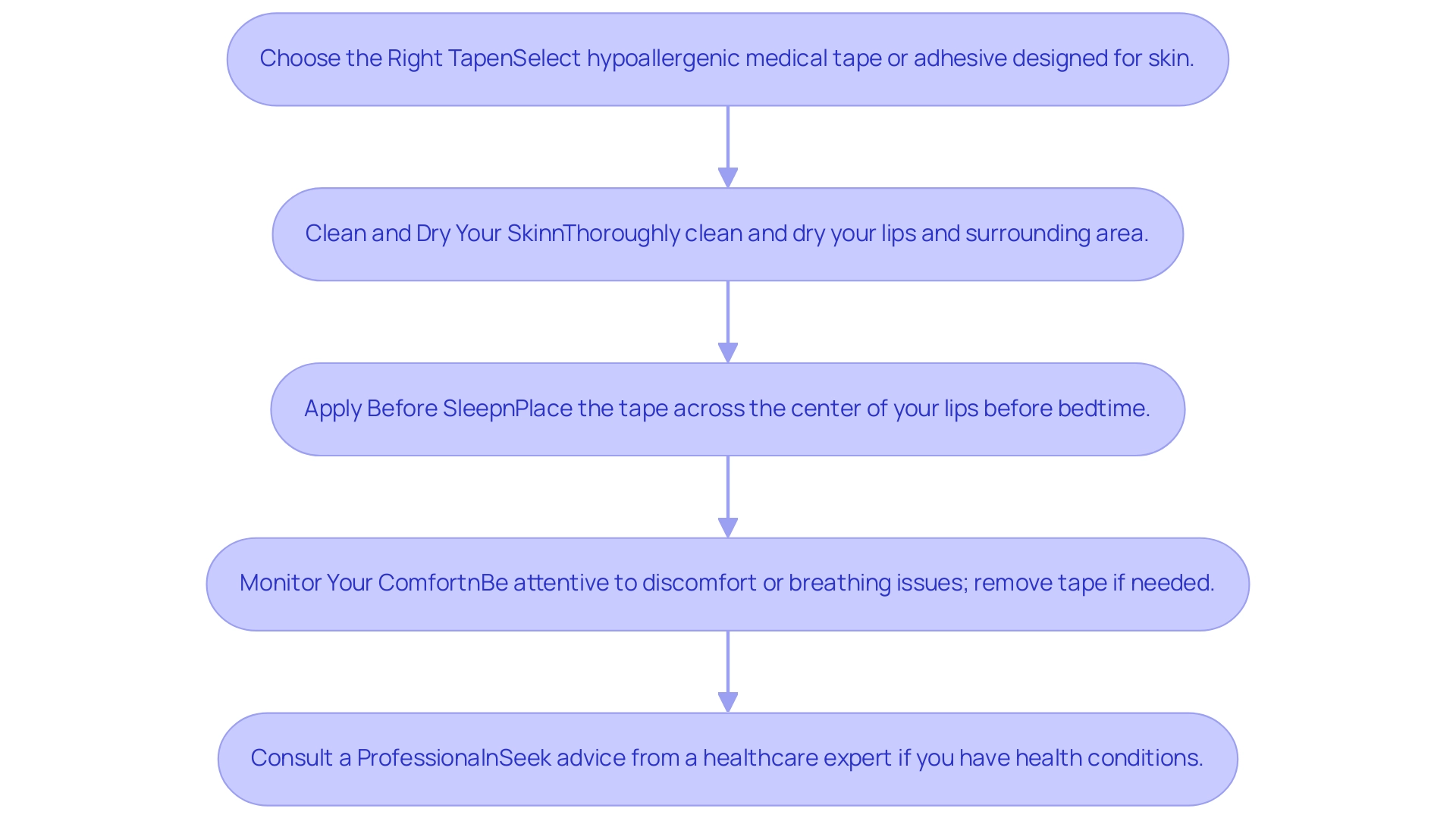
5. Risks and Considerations: What You Should Know Before Mouth Taping
While the practice of lip taping is often promoted for its potential benefits, it is crucial to recognize the associated risks. Individuals suffering from nasal obstructions, such as a deviated septum or chronic sinusitis, may experience discomfort or ineffectiveness when using oral tape. Furthermore, those who struggle with anxiety or claustrophobia might find the sensation of having their lips sealed uncomfortable or distressing.
It is particularly crucial for individuals with apnea to avoid using tape on the lips without prior consultation with a healthcare professional, as this method could potentially worsen their symptoms. Health expert Kathryn Palmer, a rest medicine specialist with Banner Health in Colorado, warns that improper rest practices can lead to serious consequences, including pneumonia and even death. Therefore, it is essential to prioritize comfort and safety, listening to your body when considering the 5 reasons why mouth tape is the secret to better sleep as a strategy for enhancing rest quality.
Additionally, Dr. Pena Orbea suggests alternative methods for addressing snoring and apnea, which may be worth exploring. For instance, specific resting positions, as highlighted in the case study 'Breathing Problems?' 'Try These Positions for Rest,' can alleviate discomfort and improve breathing during rest.
Moreover, research indicates that the only demonstrated benefit of mouth taping relates to 5 reasons why mouth tape is the secret to better sleep, specifically a
reduction in snoring and tiredness in people with obstructive sleep apnea, making it vital to weigh these factors before deciding on this practice.
Conclusion
Conclusion
Mouth taping presents a promising approach for enhancing sleep quality by promoting nasal breathing. This method not only alleviates common disturbances such as snoring and dry mouth but also supports overall respiratory health. The benefits are underscored by research indicating that nasal breathing improves oxygen intake, leading to deeper, more restorative sleep cycles. Additionally, the incorporation of supplements like ashwagandha can further bolster these effects, making it a comprehensive strategy for nighttime wellness.
However, it is essential to consider the safety and appropriateness of mouth taping for individual circumstances. While the technique may be advantageous for many, those with existing respiratory issues, anxiety, or severe sleep apnea should seek professional guidance before trying this method. Understanding personal health needs and potential risks is crucial for ensuring a safe and effective sleep improvement strategy.
In summary, mouth taping is a practical tool for those seeking to enhance their sleep quality through the promotion of nasal breathing. By carefully weighing the benefits against the considerations, individuals can make informed decisions about incorporating this practice into their nightly routines. As sleep-related issues continue to rise, innovative solutions like mouth taping may play a vital role in fostering better health and well-being.
